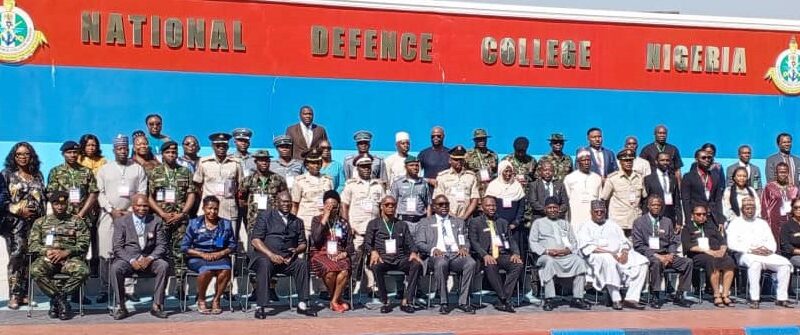non-kinetic approach is key to solving conflict in the N/East-NDC province.
A non-kinetic approach is crucial to winning wars against insurgencies and conflicts in the North East and other regions of the country, according to Prof. Adam Ahmed, provost of the National Defence College (NDC).
The NDC, in collaboration with the Centre for Strategic Research and Studies, hosted a workshop on defence and security management on Monday in Abuja, where Ahmed made the statement.
After the federal government introduced the non-kinetic strategy, he pointed out that the kinetic approach had failed to provide as many results.
According to him, the program’s primary objective is to provide training for members of the Nigerian Armed Forces, security forces, and strategic allied MDAs at the middle and senior levels.
The one that is now underway is the seventh iteration, which means it has been running for the last seven years.
Additionally, we take great pride in this training. Why? For the simple reason that it acquaints people with the components that are crucial to protection.
It is highly unlikely that the training will have any kinetic effects on security or the management of people in conflict or peace zones. The focus is on administration.
In other words, it’s offering an alternative to viewing problems and security concerns via a purely kinetic, militarised lens.
After stating that the non-kinetism component had been successful, he praised the federal government and other MNJTL partners for implementing it.
As far as he was concerned, the training may help those tasked with conflict management in disaster zones become more effective.
You see, we had to get away from all the damn hellish, militaristic stuff. The vast majority of the tens of thousands of surrenderees, however, are clearly not genuine kinetics.
I mean, it’s not kinetic in the slightest, but what we have managed to implement—the non-kinetic methodology, the concept, and precept variables—has sprouted and produced fruit, where a lot of people are showing up.
Importantly, by tying the material to current events in the Northeast, this training will provide its participants with the knowledge to handle the issue without resorting to kinetic measures.
And not just in the Northeast; nationwide. throughout the nation and all of West Africa. He made this statement after explaining that crises and conflicts are visible on a global scale.
Participating workshop speaker Prof. Istifanus Zabadi stated that the goal of the course was to integrate non-military and military strategies for dealing with domestic conflicts.
That is why Zabadi hammered home the point that all branches of the national security apparatus must coordinate their efforts to keep the nation secure.
“We must all do our part to ensure the protection of our nation and its citizens, both from inside and without.”
He emphasised the importance of carrying out their responsibilities with a compassionate attitude.
That is something they need to understand. For example, one of our principles is to address gender equality in the course of their work.
And now it’s in the records. Therefore, if we are aware of that, we will not treat women, people with disabilities, children, and the like any differently.
“Now that you have been equipped to realise that the next person sitting next to you, whether they are wearing a uniform or not, their job is integral to yours and ensures our safety and security as a nation,” he said.
According to Dr. Adam Abdullahi, the course’s coordinator, its primary goal was to equip its participants with the skills necessary to carry out their responsibilities more effectively and to be ready for strategic leadership engagements.
Abdullahi added that the program’s main focus would be on wondering, “How can we safely relocate liberated villages in the northeast away from dangers like IEDs and mines?”




